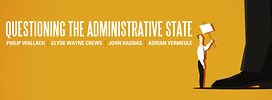Professor Vermeule asks three entirely reasonable questions, which bring helpful clarity to our conversation.
With regard to his first point, he is entirely correct to say that Clyde Wayne Crews’ points are arguments against excessive state power generally, not against the administrative state specifically. The same is true of my contributions. I think that this is a legitimate criticism of my comments for which I am willing to apologize. I was happy to be invited to participate in this discussion, but I am trained as a philosopher, not a political scientist. My perspective is the perspective of moral philosophy, and from that perspective, it does not matter much whether the legislature or the executive wields too much power. The problem is the power, not who wields it.
With regard to his second point, I have nothing to say. My objections in this context are not to the content of any regulatory policy, but to the power to regulate itself.
His third point addresses the relative scope of Congressional and executive rulemaking authority. In my last intervention, I intentionally restricted my focus to this question. I stated that I preferred that rule making power remain vested in the legislature.
I hope that I was clear that I do not take this position because I believed either “that the Constitution makes Congress the preferred lawmaker, or that Congress has unique institutional properties (representativeness, deliberation, etc.).” I take this position because it is physically impossible for the legislature to do as much as the executive agencies are able to do. Congress has more limited human capital and more limited financial resources than the executive. Further, it is internally divided and easily distracted, which renders it much less efficient. Given that the federal government long ago slipped its constitutional bonds, I favor legislative over executive law making in order to place some restriction on how much the federal government can interfere in our lives.
If the question that is addressed to me is whether Congressional or executive rule making is more efficient, then I am clearly on Professor Vermeule’s side of the argument. However, as a normative matter, the last thing I want is efficiency in government’s ability to restrain individual liberty.
Professor Vermeule closes his last posting by asking whether “the putative objection to delegation really [is] a disguised objection to the relevant law being made at all, by anyone?” My answer to this is, “yes, but I did not intend it to be disguised.” He is entirely correct to point out that in such a case, I am having “a conversation about the state, not the administrative state,” which may make me a poor interlocutor for this topic. But I can only write about what I know.
As a final note, I may also owe an apology to Philip Wallach for not understanding what he meant by the term “legitimacy.” Mr. Wallach clarified this in his last posting, stating that he was using the term to refer to “an emergent social fact—positive, and not normative (or “moral”) legitimacy,” and that “[w]hen I say that representative governments have often achieved legitimacy, I do not mean to imply that they meet Hasnas’s (or Crews’s) exacting standards, but that they have employed processes and produced results that most people find broadly acceptable.”
My obtuseness on this point may again be due to disciplinary differences. Perhaps this use of “legitimacy” is an accepted term of art that is well understood by political scientists. But even now, to my philosopher’s ear, the concept of non-normative legitimacy sounds like an oxymoron. It seems to imply that even extremely repressive regimes can be legitimate as long as people acclimate themselves to the repression and find the resulting state of affairs “broadly acceptable.”
I will close by observing that if Mr. Wallach is using the term “legitimacy” to refer to “results that most people find broadly acceptable,” then it seems to me that Professor Vermeule clearly wins the argument. For under this understanding of the term, the administrative state is clearly legitimate.

